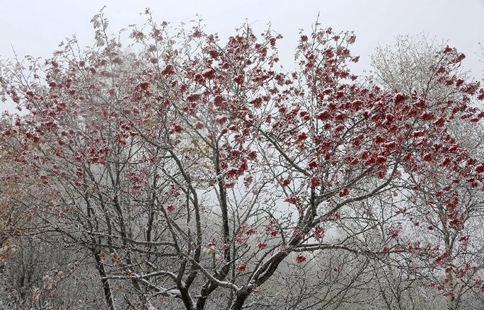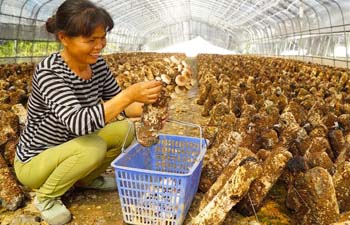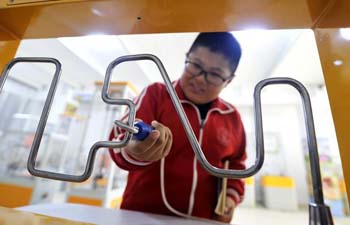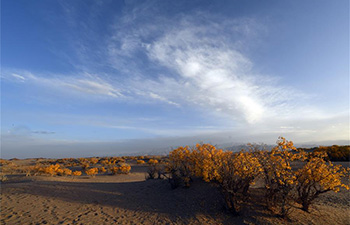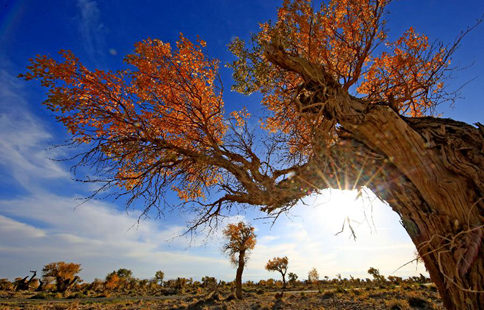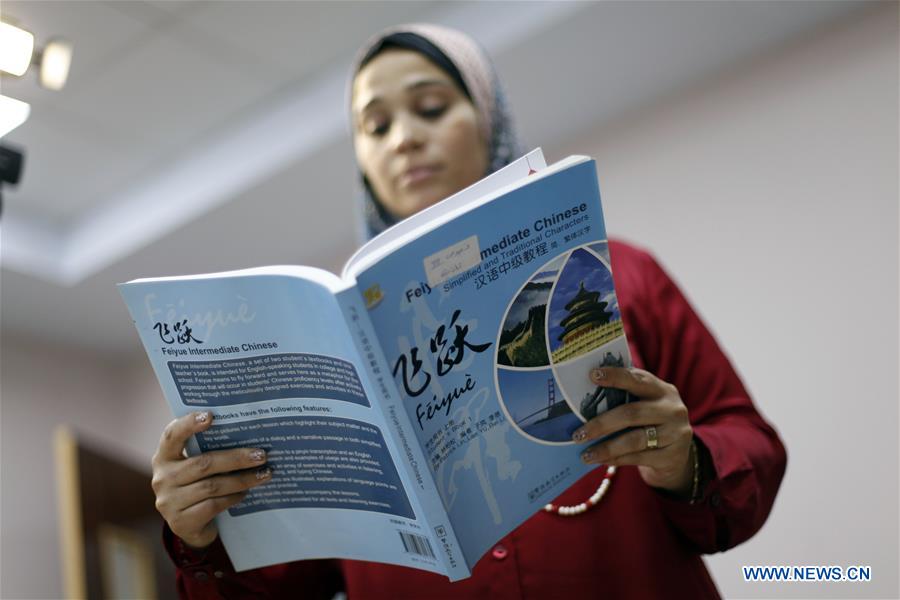
Rasha Kamal reads a Chinese textbook in her office at the Ain Shams University in Cairo, Egypt, on Sept. 28, 2017. Recommended by their brother Abdullah Kamal, a famous Egyptian journalist who foresaw the rise of China as a global power, twin sisters Rasha and Shiamaa Kamal decided to study the Chinese language in the 1990s only for better understanding the mighty economic force. Now, they have become the building blocks of a bridge that connects the cultures of China and the Arab world, working as established translators and lecturers in the Chinese language. (Xinhua/Ahmed Gomaa)
by Marwa Yahya
CAIRO, Oct. 6 (Xinhua) -- Recommended by their brother Abdullah Kamal, a famous Egyptian journalist who foresaw the rise of China as a global power, twin sisters Rasha and Shiamaa Kamal decided to study the Chinese language in the 1990s only for better understanding the mighty economic force.
Now, they have become the building blocks of a bridge that connects the cultures of China and the Arab world, working as established translators and lecturers in the Chinese language.
"Since my first year in al-Allsun Language College in 1996, my sister and I, had a clear objective to contribute to promoting knowledge, transferring and introducing as much information as we can about China into the Arab world," Rasha Kamal, a 38-year-old professor of Chinese language at the Ain Shams University, told Xinhua.
Since 2011, Rasha has translated and edited 36 books about China, including China's great economic leap, the Belt and Road initiative, the biography of Deng Xiaoping, the architect of China's reform and opening up policies, and a series of books about Xinjiang Uygur Autonomous Region in northwestern China.
"I'm very keen on cooperating with China's Ministry of Culture to define the Chinese history, culture and civilization from the Chinese original perspective, not from the West's mistaken understanding," said Rasha, the younger sister.
Shiamaa, chair of the Chinese Department of the Badr Private University in Cairo, told Xinhua that Egyptians are now more eager to read, study, watch and get involved in activities that could deepen their knowledge about and connection with the success stories of China.
The number of Egyptian students studying in the Chinese Department in al-Allsun is now 250, a sharp rise from 40 in 1995. Meanwhile, many private universities across Egypt have opened new departments recently to teach the Chinese language and literature.
The Kamal twin sisters, both passionate Chinese culture lovers, said they have taken part in most of the meetings, seminars, workshops, art shows, music concerts, book fairs in Arab countries about China since their graduation in 2000, to raise the awareness and knowledge about the Asian power.
"It's our role as academic instructors and translators to erase the false perception about a country that had been conservative and closed for decades," said Shiamaa, who just attended a seminar recently in the United Arab Emirates on the Belt and Road initiative.
Proposed by Chinese President Xi Jinping in 2013, the initiative aims to build a trade and infrastructure network that connects Asia with Europe, Africa and the Middle East along the ancient trade routes, to seek common development and prosperity.
China has been transferred into a global power over the past 40 years from a poor developing country, through its tremendous determination, confidence and hard work.
"China's hands are now extended to the third-world countries based on mutual interests and cooperation rather than confrontation, with a focus on the principal of give and take," Rasha said.
After achieving an economic leap that has great impact on global politics, China has started to pay much attention to promoting its culture, or the soft power.
China, which used to be a closed nation with a full concentration on advancing its own culture, has now become a more open society to other cultures, Rasha noted.
The Kamal sisters see the Belt and Road initiative as "a golden chance for enhancing the cultural ties."
Shiamaa, who has translated three books on the Belt and Road initiative into Arabic, noted that there are so many different minorities, ethnic groups, religions and historic backgrounds that would be translated to connect the countries along the Belt and Road routes.
Rasha praised the initiative not only because it focuses on promoting partnerships and cooperation with participants, which is totally different from the Western models, but also because it shows China's determination and great efforts to convince its partners to support and advance it.
She cited that China, in marketing the Belt and Road initiative, has established research centers, held seminars and conferences, and translated related information into several languages.
Official statistics found that Egyptian youths like to work in China's projects that are spreading in the entire region, and to learn the Chinese language in order to work as tourist guides.
With nearly 200,000 Chinese tourists visiting Egypt in 2016, China has become the fourth largest source of tourists for Egypt, in a major boost to its tourism industry that has been suffering from a slowdown due to political turmoil and terror attacks since 2011.
Accordingly, the two sisters believe Egypt and China should enhance coordination, not only between their culture ministries, but also between the publishing and translation industries in the two countries.
Besides attending many book fairs and seminars on China in the Middle East in 2017, Rasha also traveled to many Arab and European countries to promote her books about China from the Chinese angle, in cooperation with Chinese writers, novelists and translators.
"When I translated a series of books on the history, geography, food, and minorities in Xinjiang, I felt like the guard for that treasures, not merely a translator," Rasha added.
Rasha is now working on translating more books about China into Arabic, including those about the Belt and Road initiative.
"Our mission is not only translation, but to introduce the Chinese culture to the Arab people," Rasha said.
The twin sisters now dream of translating the Islamic-Chinese encyclopedia into Arabic, as they see it as a very important step for correcting the inaccurate information about Chinese Muslims and introducing the Chinese philosophies, ethics and social disciplines to the Arab countries.
"The Arabic and Chinese languages might be difficult, and their distance is far apart, but the cultural rapprochement would narrow the gap and eliminate the difficulties," Shiamaa said.




